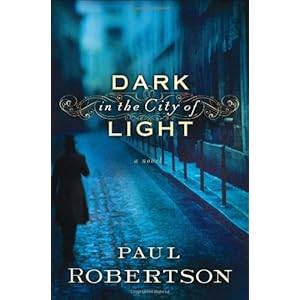 Paul Robertson certainly could not be accused of exploiting one particular genre. No niche for him. His previous novels (linked to my review) centered around a DC bookseller in According to Their Deeds, a city council making a decision on a municipal project in Road to Nowhere, and a wealthy beneficiary embroiled in politics and murder in The Heir. His newest novel, Dark in the City of Light, takes place in Paris in 1870s at the brink of the Franco-Prussian War. From the publisher’s description:
Paul Robertson certainly could not be accused of exploiting one particular genre. No niche for him. His previous novels (linked to my review) centered around a DC bookseller in According to Their Deeds, a city council making a decision on a municipal project in Road to Nowhere, and a wealthy beneficiary embroiled in politics and murder in The Heir. His newest novel, Dark in the City of Light, takes place in Paris in 1870s at the brink of the Franco-Prussian War. From the publisher’s description:
What Evil Haunts the Shadows of 1870s Paris?
Baron Ferdinand Harsanyi — After his wife’s mysterious death, this Austrian attaché holds control over mines whose coveted ore could turn the tide of war.
Therese Harsanyi — Swept up in new romance and the spectacle of Paris, the Baron’s daughter is blind to the dangers stalking her family and the city she loves.
Rudolph Harsanyi — Unsure whom to trust, the Baron’s son’s grief over his mother’s death twists into growing anger and a desire to break free.
As France and Prussia plunge toward war, one family is caught in a web of deceit, political intrigue, and murder that threatens to tear them apart.
I’m a big fan of Robertson’s smart wit and clever writing and I wanted to like Dark in the City of Light. Don’t misunderstand, I did like it but not nearly as much as I anticipated. The premise is interesting and the history obviously well researched yet through much of the novel I felt confused, in the first half particularly. The second part of the novel moved at a faster clip despite some rather too coincidental coincidences and a shifting timeline. Robertson’s beautiful prose is evident here in this novel as well, though missing some of the wit and intelligence that marked his earlier novels. His descriptions of Paris in its glory and later in its siege capture the stark contrast between the opulence and the resulting devastation. Despite the complicated plot, Dark in the City of Light is still an interesting novel and those who enjoy a historical mystery will find much to like. Personally, I still prefer his earlier novels, According to Their Deeds in particular, but Dark in the City of Light is not without merit.
Interested? Read an excerpt here.
Wife and mother, Bible teacher and blogger, Lisa loves Jesus, coffee, dark chocolate and, of course, books. Read more of her reflections at Lisa writes…. Lisa thanks Bethany House publishers for providing the review copy of Dark in the City of Light!
Hi Lisa
I enjoyed your review. I had heard about this one and thought I might want to read it. I have a question, though. When you say the first part was somewhat confusing, I was wondering in what why. Was the plot line very convoluted, or was there alot of historical information that the reader is assumed to know…or something else?
Thanks.
It’s hard to say, really, the exact reasons for my confusion. I don’t think the reader is assumed to know all the details of the Franco-Prussian conflict, though I will admit that being ignorant of that particular history made me a little confused as to who was who. Also, a particular event in the early stages of the novel left me uncertain as to where my sympathies were supposed to lie, which was, I think, intentional on the part of the author. Throughout the novel, the author tells a portion of the story from one character’s point of the view, usually followed by a chapter backing up to cover the same timeline from another character’s point of view which, without proper indicators, can be a little confusing for the reader. It’s in the latter part of the book that the suspense and mystery mount which made the novel more enjoyable than the first part.
Great question; thanks for commenting!
I appreciate your review. This book had a lot of potential, but I got bogged down and couldn’t get through it. Glad to know it’s not just me!